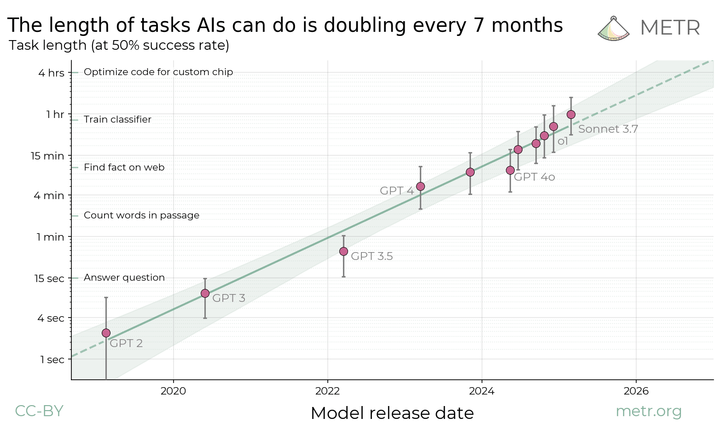“We tend to overestimate the effect of a technology in the short run and underestimate the effect in the long run.” – Amara’s Law
With the emergence of AI agents as the next big thing in 2025, skeptics are quick to point out current limitations — from hallucinations in Large Language Models (LLMs), to the energy costs of inference, and the brittleness of Computer Using Agents (CUAs) like OpenAI’s Operator, Anthropic’s Computer Use, and Google’s Project Mariner.
But here’s what they often miss: progress in AI is compounding — and fast.
According to the latest research by METR, agentic AI performance has been doubling roughly every 7 months over the past 6 years. That’s significantly faster than Moore’s Law, which posits a doubling of computing power every two years.

The paper introduces a useful proxy for measuring agent capabilities: the “time horizon” — the length of task a model can complete without human intervention. Claude 3.7 Sonnet, for instance, has a time horizon of 59 minutes, meaning it can autonomously complete workflows that would take a skilled human nearly an hour.
Extrapolate this trend forward just five years, and we’re not talking about automating tasks that take minutes or hours — but days or even weeks of skilled human effort. Imagine AI agents capable of managing an entire product launch, performing complex financial audits, orchestrating multi-channel customer campaigns, or even writing and debugging entire software systems — end-to-end.
⚠️ Implications:
- Redefinition of Knowledge Work: Much of what today constitutes “white-collar” effort — research, analysis, planning, documentation — could soon be agent-executable.
- Economic Productivity Leap: As agents scale up in task duration and complexity, they could unlock productivity gains unseen since the Industrial Revolution.
- Strategic Disruption: Organizations that treat AI agents as mere "assistants" risk falling behind those that reimagine their workflows around autonomous, goal-driven agents.
- A New Agentic Workforce: Businesses won’t just be hiring people — they'll be onboarding agents, maintaining agent teams, and optimizing human-agent collaboration.
Just like with the internet or the smartphone, the full impact of AI agents may not be obvious at first — until, suddenly, it is.
#AIAgents #AgenticAI #FutureOfWork #AI #ArtificialIntelligence #DigitalTransformation #AgenticWorkforce #AmarasLaw
The “Moore’s Law” for AI Agents 🤖